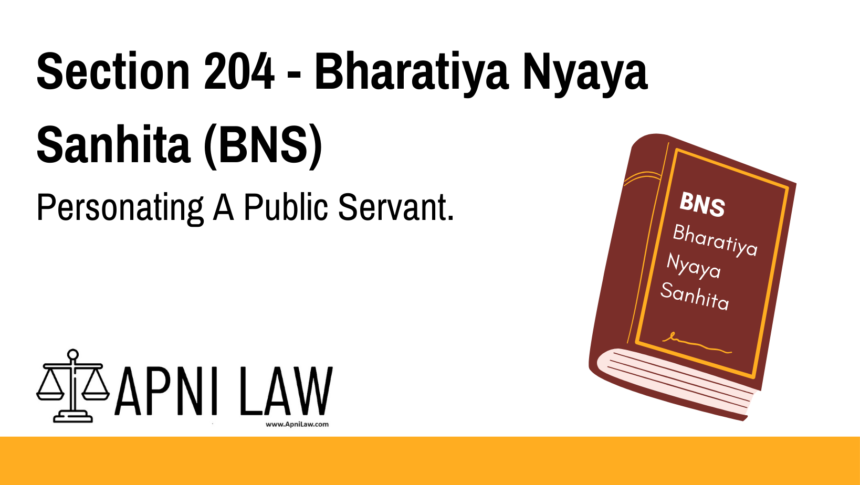Code
Whoever pretends to hold any particular office as a public servant, knowing that
he does not hold such office or falsely personates any other person holding such office, and
in such assumed character does or attempts to do any act under colour of such office, shall
be punished with imprisonment of either description for a term which shall not be less than
six months but which may extend to three years and with fine.
Explanation
Section 204 of the Bharatiya Nyaya Sanhita (BNS), 2023, deals with cases where a person falsely represents themselves as a public servant and uses this false identity to perform or attempt to perform official duties. This offense is punishable by up to two years of imprisonment, a fine, or both.
Key Elements of Section 204 BNS
- Falsely Personating a Public Servant:
- The accused must pretend to be a public servant (e.g., police officer, judge, revenue officer).
- Attempting to Act in Official Capacity:
- Simply claiming to be a public servant is not enough; the person must attempt to perform an action under the pretense of official authority.
- Punishment:
- The offense is punishable by imprisonment of up to two years, a fine, or both.
Illustrations
Example 1: Impersonating a Police Officer
A man wears a police uniform and demands bribes from shopkeepers. Since he falsely impersonates a police officer and attempts to act in an official capacity, he will be liable under Section 204 BNS.
Example 2: Fake Government Officer Conducting Raids
A person pretending to be an income tax officer enters a business establishment and claims to conduct a raid. If caught, they will be punished under Section 204 for impersonating a public servant.
Common Questions and Answers on Section 204 BNS
1. What is the punishment for personating a public servant under BNS?
The punishment includes up to two years of imprisonment, a fine, or both.
2. Does the person need to successfully deceive others to be punished under Section 204?
No, even an attempt to act under a false identity is sufficient to attract liability under this section.
3. Is this offense bailable or non-bailable?
Generally, the offense is bailable and triable by a Magistrate.
4. Can an ordinary citizen arrest someone impersonating a public servant?
Yes, any citizen can report such a case to the police, and law enforcement has the authority to arrest the offender.
5. Is impersonating a public servant different from impersonating a private individual?
Yes, impersonating a public servant involves an attempt to misuse government authority, making it a more serious offense than impersonating a private individual.
Conclusion
Section 204 BNS is an important provision that protects public trust in government officials. It ensures that no one can falsely claim official powers to deceive or exploit others.
For more legal insights, visit ApniLaw today! 🚀








